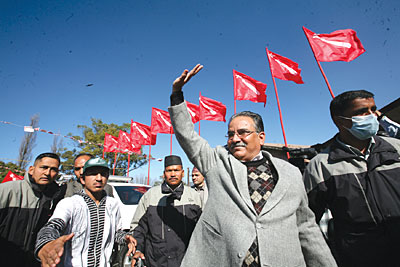 KIRAN PANDAY |
The initial disparagement that met Pushpa Kamal Dahal's announcement last week that he would turn universities into barracks "if the regressive elements do not stop plotting" against the Maoist Party seems to have swiftly been replaced by the chatter over the shooting incident implicating ex-prince Paras in Chitwan.
Not one to miss a chance to grab the headlines, his party pounced once again on the "regressive elements" by claiming that the shooting incident was engineered by India, and the person who was allegedly shot at should be investigated because "it involves the issue of nationality."
It would seem that resorting to Tea Party extremism, and hoping for things to become true if you repeat them a hundred times, is unbecoming for the largest party in the country. Is this an indication of the immaturity of our politics?
2011 will mark five years since the Maoists left the 'jungle'. In 2006, Dahal was seen in Kathmandu for the first time, and his arrival was greeted with a mix of trepidation and excitement. He had led a war that had cost 13,000 lives, but his party had also fought for the people ignored by the state and the ruling elite in Kathmandu. "Will he be a hero or a villain," a commentator asked at the time. "It will depend on what he can deliver in Nepal's future set-up," was the answer.
Five years is a substantial time if you are among those who like to get things done. That is how long it took to build the atom bomb, the Achilles' heel of modern international relations. It took the same time to build the first space shuttle. Historians say it took even less time to build a pyramid, although admittedly the Pharaohs used thousands of slaves.
The point is it is possible to lead change that can have lasting effects into the future in five years. Dahal led his party through a comfortable election victory, and led a government with some clear indications of success like a surge in national revenue collection. But he lacked agility in situations that required teamwork. Yet he did something unheard of in Nepali politics, and resigned from the government after losing a tug-of-war over the dismissal of the army chief.
Almost everyone agrees the Maoists won the election because they promised change from the same old politics. But with a lack of vision and an outdated ideology, they seem to have lost their edge through complacency, unable to compete in the realm of realpolitik, and continually resorting to threats of violence.
As with other parties, the Maoists' mode of operation now seems to be to create enough noise to keep the people on top busy without doing anything for those at the bottom. Dahal's contribution in the past five years, especially in the last couple of years, has been to feed the noise in that echo chamber. Of late it is the laughable endorsement of the argument that India staged the shooting incident in Chitwan.
When a party's leader leadership fails to make a government work and starts losing the support of his peers, it is time for him to resign and make way for a new leader. This is an opportunity for Dahal to take the high road, and resign once again. This solution is simpler than the war we have been promised.
READ ALSO:
Who's bad?, EDITORIAL
Hollow loktantra, PRASHANT JHA
Aiding impunity, DAMAKANT JAYSHI



